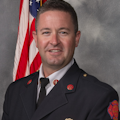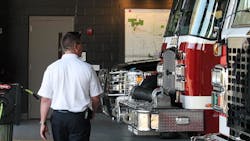I’ve been coming in to work early for years. Like many firefighters, I have a difficult time “turning it off”—after all, being a firefighter is a lifestyle; it isn’t a job.
When I was a company officer on shift, I arrived early to get a jump start on emails and planning for the day. This also sent a message to my team, letting them know that I was prepared and ready to lead.
When I moved into administration and no longer was on a shift, I used the time in the morning to finish anything that I needed to and, maybe, get a jump on emails from the late afternoon/evening and make sure that I was ready for the challenges of a new day. I often got a lot done before the crews from the night came down for coffee.
The past few years, I still come in early, but I leave the emails and paperwork for later. Instead, I walk. I walk the apparatus floor and listen to the lessons of the firehouse, which we too often rush right by and miss. A firehouse has a soul and a personality, and if you pay attention, you can feel the energy of the firehouse apparatus floor in the early morning hours when no one else is around. I invite you to join me on one of my morning walks.
Tool room, cleaning supplies, lockers
I arrive at the firehouse a couple of hours before my actual day starts. Unless the crews are returning from a run, it’s quiet.
As I start my walk, I move past the tool room that our fleet manager uses to keep our vehicles, trailer and specialized equipment ready—clean, orderly and set for the next project. I smile with pride, because I know that he’s good at his job.
Moving on, I walk past the room where we keep mops, towels and miscellaneous cleaning materials. I notice the recruit rider from the night before has the truck brushes, soap and towels ready for the team, which will be down soon.
I keep moving.
I get out a few weights from the exercise storage area and stage them for my walk, and I move past our lockers. Firefighters’ lockers often provide a window into their personality—rows of turnout gear, boots, nameplate. I remember how hard I worked to earn my nameplate and my place on the wall of lockers at old Elburn Station #1.
I notice Dan’s Star Wars helmet, Trevor’s cornhole boards, Capt. Schopp’s helmet, which has seen fires and accidents that I hope our younger firefighters never have to. As firefighters, we see, hear, smell and experience things that can take a toll on us. This is a concern of mine and has become a focus of what I try to do with my time in administration. Every firefighter is different, but we offer them options and tools to process these emotions, so they can be their best for themselves, their families and their team. Tomorrow, odds are that I will notice something different in the lockers.
The bay, the offices
I round the corner by the training tower, where just a few hours before the academy students worked through challenges and learned to depend on each other and to protect each other. Drying hose, training props and tools are left out, but this doesn’t bother me. Instead, I smile again, because our team is working to develop each other and improve each other. I would much rather see training equipment left out than packed away, collecting dust.
I pass the work room. Honestly, it always can use a little organizing, but I know every firehouse is similar.
I turn and make my way across the front of the bay floor. Twenty years here, and I still am impressed by the size, quality and sheer power of our vehicles. Each rig has its own personality, and I start to remember my time on the engine. I enjoyed being an engineer very much. Learning how to maneuver, place, and run that vehicle and pump was a thrill, and I was good at it.
As I keep moving, out of the corner of my eye I notice the lieutenant’s gear, and I smile. We came up together. I’m proud of this gentleman. His gear is laid out strategically because of a lesson learned along the way. I know that he does this so that he will be dressed first and will set the pace for the crew.
I move past the ambulance and notice that the hood is warm from an early morning run, likely just completed, and I hope that the engine crew will let the medics grab a few extra winks before house chores start to get completed.
Next is the wall map. Although our recruits have grown up with smartphones and GPS mapping, they will learn how to read a map, understand addressing and learn our unique district.
As I approach the shift office, I can smell the wonderful blend of old and fresh coffee. This is a smell of beauty in a firehouse, and something that, undoubtedly, I will miss one day. If I were to walk in, I would find the morning coffee prepped and the garbage cleared by the recruit or newest firefighter. It’s a rite of passage and part of earning the respect of those who keep an eye on you and train you.
As I move past the lieutenant’s office, I hear the overhead radio messages of a neighboring town finishing a run, and I make a silent nod of respect, because it sounds as though they were out all night. I chuckle, because tonight it probably will be us.
I pass my buggy. It’s clean and ready to go.
Second lap
Soon, our recruit will come down, followed by the officer from the night before. I know the recruit will be quick to get the coffee going, clear the trash and begin to anticipate the needs of the crew. An officer waking up early makes me happy—out in front and completing paperwork before the rest of the crew comes down.
The rest of the crew will filter down soon, possibly letting the most senior firefighter grab a few extra winks because of earned respect. This also makes me proud. We all have many men and women to thank for lessons and examples, both good and bad. No firefighters anywhere in the world became good at their craft without the help and guidance of others. It’s good to let that senior firefighter get a little more rest. (Maybe one day it will be you.)
The stored energy of an early morning firehouse is palpable, like that of a pride of lions that’s resting, ready at a moment’s notice. Lions rest, they don’t really sleep. Firefighters also rest, rarely achieving any quality of sleep. I’ve been told that a couple of years after you retire you actually can sleep.
I continue to make my laps, and I listen and absorb the energy that’s all around me, paying attention to the lessons that I learned over my 20 years her. I reflect on how yesterday and last night went and what I can do better today.
Finishing my morning walk, I approach the shift office. It’s starting to fill up with members from yesterday’s crew and the on-coming crew, ready for the morning pass-on meeting. This is a special area and time. Because I’m not on a shift anymore, I must be conscious of the energy and attitude of this room and the morning discussion(s). That was one of the most difficult parts of transitioning to days as a chief officer: I enjoy morning coffee with the crews very much but now often exit early. They need to have this time.
Two decades and counting
This is my 20th year in the fire service, and every morning walk brings back different memories or lessons.
I’m incredibly proud of the members of this department. Firefighters are problem-solvers: People call us when they have a problem, and we must bring the highest quality of problem-solving to each incident.
We also tend to overcomplicate the profession.
Here are a few things that I learned in my 20 years to keep the focus on the members and to give them the tools to thrive.
- Actively listen to the ideas and opinions of everyone, from the newest recruit to the most seasoned member
- Have meaningful and genuine conversations with your members, but if you can’t be genuine, don’t bother, because they will see right through you
- Tuck your shirt in, shine your shoes and wear the uniform with pride
- Protect your crew by keeping your rig and equipment clean
- If you get off a rig and move to a command car or staff vehicle, wash your own car, because your crews have more important things to do
- If the opportunity presents itself, help the crew wash the rig(s)—not to get a pat on the back but simply because it’s the right thing to do and sends a message to the recruit
Finally, keep the mindset of a recruit and “take it all in.” I learn something new every day, often before 5:30 a.m.
About the Author

Matt Hanson
Matt Hanson has served the Elburn & Countryside, IL, Fire Protection District as a firefighter/paramedic, lieutenant, shift supervisor and, currently, as the assistant chief of personnel and administration as well as via the MABAS Division 13 Technical Rescue Team and Training Committee. He has a bachelor’s degree in social work and a certificate in case management from Indiana University.
